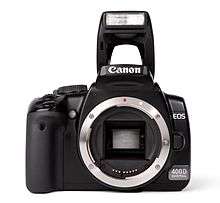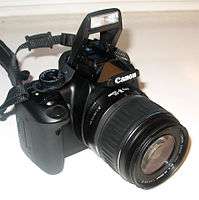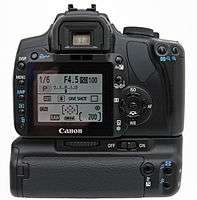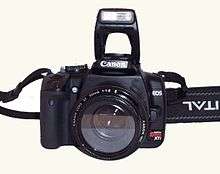Canon EOS 400D
 | |
| Overview | |
|---|---|
| Type | digital single lens reflex camera |
| Lens | |
| Lens | Canon EF lens mount, Canon EF-S lens mount |
| Sensor/Medium | |
| Sensor | CMOS APS-C 22.2 mm × 14.8 mm (1.6× conversion factor) |
| Maximum resolution | 10.1 effective megapixels, 3,888 × 2,592 |
| ASA/ISO range | ISO 100 to 1600 |
| Storage | CompactFlash Card Type I & II |
| Focusing | |
| Focus modes | One-Shot, Predictive AI Servo, automatic switching Autofocus; Manual Focus |
| Focus areas | 9 AF points |
| Exposure/Metering | |
| Exposure modes |
automatic shiftable Program, Shutter-priority, Aperture-priority, Auto Depth-of-field, Full auto, Programmed modes, Manual, E-TTL II autoflash program AE |
| Exposure metering | full aperture TTL, 35-zone SPC |
| Metering modes | Evaluative, partial (approx. 9% at center of viewfinder), center-weighted average |
| Flash | |
| Flash | E-TTL II automatic built-in pop-up, 13 m ISO 100 guide number, 27 mm (equivalent in 35 format) lens focal length coverage; compatible with Canon EX Series Speedlite external hot shoe-mount flashes |
| Shutter | |
| Shutter | focal-plane, vertical travel, mechanical |
| Shutter speed range | 1/4000 s to 30 s, bulb, 1/200 s X-sync |
| Continuous shooting | 3 frames/s for 27 JPEG frames or 10 raw frames |
| Viewfinder | |
| Viewfinder | Eye-level pentamirror SLR, 95% coverage, 0.8× magnification |
| Image Processing | |
| Custom WB | Auto, Daylight, Shade, Cloudy, Tungsten Light, White Fluorescent Light, Flash, Manual, user-set |
| WB bracketing | +/- 3 stops in 1-stop increments; |
| General | |
| Rear LCD monitor | 2.5 in (6.4 cm) color TFT LCD, 160° viewing angle, 230,000 pixels |
| Battery | NB-2LH Battery Pack |
| Dimensions | 126.5 mm × 94.2 mm × 65 mm (4.98 in × 3.71 in × 2.56 in) (W × H × D) |
| Weight | 510 g (18 oz) (body only) |
| Made in | Japan |
The EOS 400D, called Digital Rebel XTi in North America and EOS Kiss Digital X in Japan,[2] is an entry-level digital single-lens reflex camera introduced by Canon on 24 August 2006.[3]
Details
It is the successor of the Canon EOS 350D, and upgrades to a 10.1 megapixel CMOS sensor, a larger continuous shooting buffer, an integrated image sensor vibrating cleaning system (first used in a Canon EOS DSLR), a more precise nine-point auto focus system from the EOS 30D, improved grip, and a bigger 2.5-inch (64 mm) LCD with 230,000 pixels and a larger viewing angle which replaces the top status screen.
The 400D uses the DIGIC II image processor, as is used in the 350D. Unlike the 350D, the 400D file numbering system holds 9,999 pictures as opposed to 100 photos in one folder. Support for the Media Transfer Protocol (MTP) USB protocol is available since version 1.1.0.[4] The latest firmware available is version 1.1.1.[4]
It was succeeded by the Canon EOS 450D (Rebel XSi in North America) which was announced at the PMA show in January 2008 with sales commencing in April 2008.
 The Canon EOS 400D with kit lens EF-S 18-55mm and neck strap
The Canon EOS 400D with kit lens EF-S 18-55mm and neck strap The 400D features a 2.5" TFT LCD (shown with optional battery grip)
The 400D features a 2.5" TFT LCD (shown with optional battery grip) A Canon EOS 400D with the EF 50 mm f/1.8 II lens
A Canon EOS 400D with the EF 50 mm f/1.8 II lens
Custom firmware
400plus is a firmware add-on which offers additional functionality for Canon 400D, such as intervalometer and custom autofocus patterns.[5]
See also
References
- ↑ "Canon EOS Digital Rebel XTi White paper" (PDF). RobGalbraith.com. Canon U.S.A. 2006. pp. 24–28. Archived from the original (PDF) on 2013-02-02.
- ↑ "Canon EOS 400D / Digital Rebel XTi". Digital Photography Review. 24 August 2006.
- ↑ "EOS 400D set to meet massive consumer demand" (Press release). Canon Europe. 24 August 2006. Archived from the original on 16 April 2015.
- 1 2 "EOS DIGITAL REBEL XTi / EOS 400D DIGITAL Firmware Update Ver 1.1.1". Canon Japan. 3 November 2007.
- ↑ User Guide for 400plus
External links
| Wikimedia Commons has media related to Canon EOS 400D. |